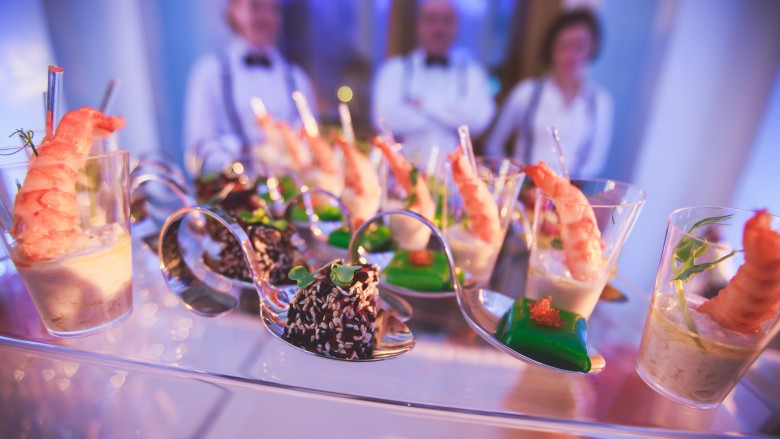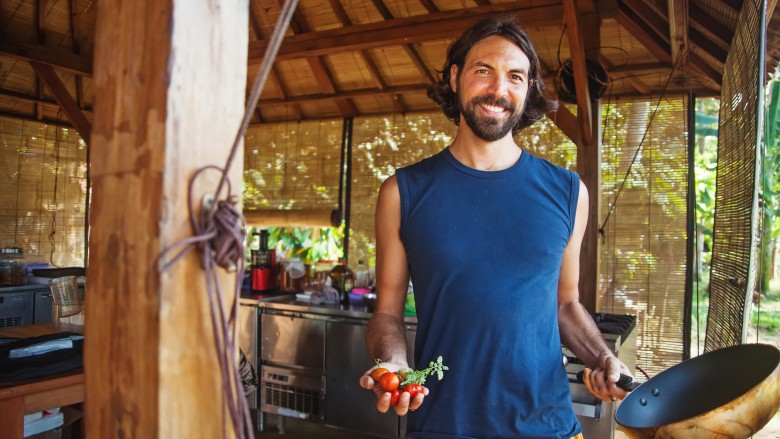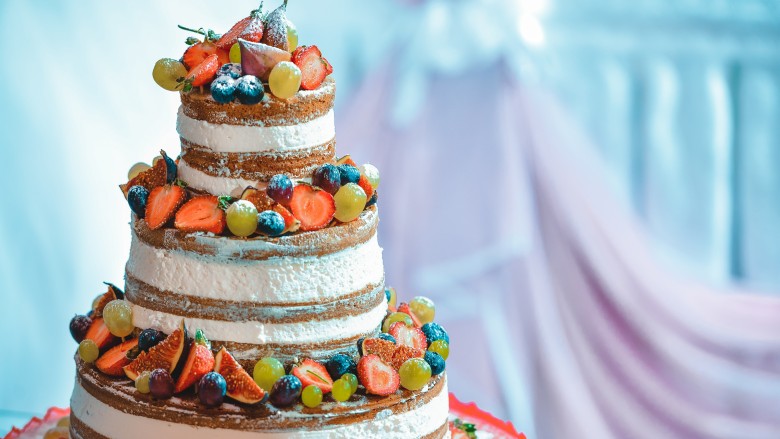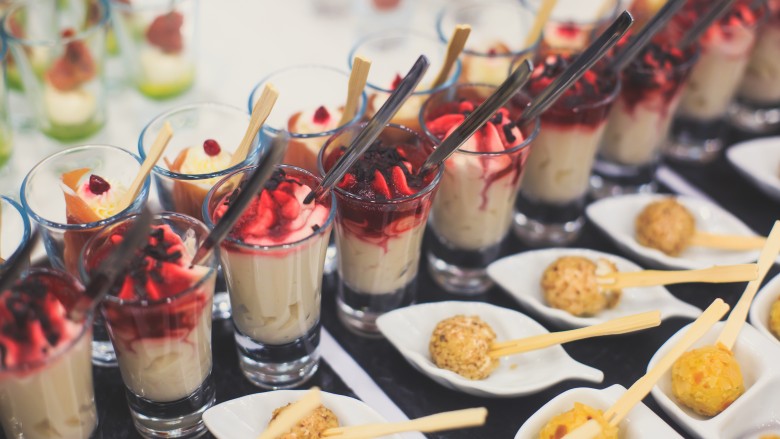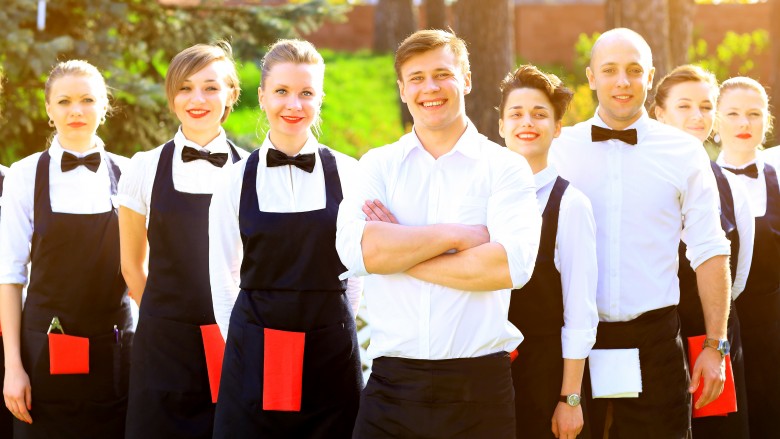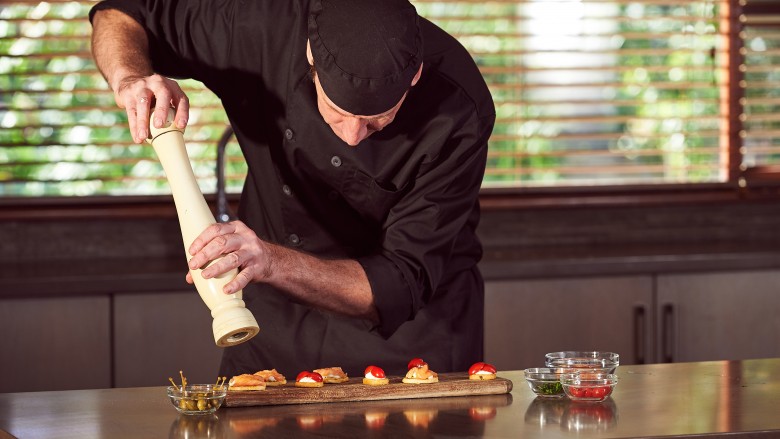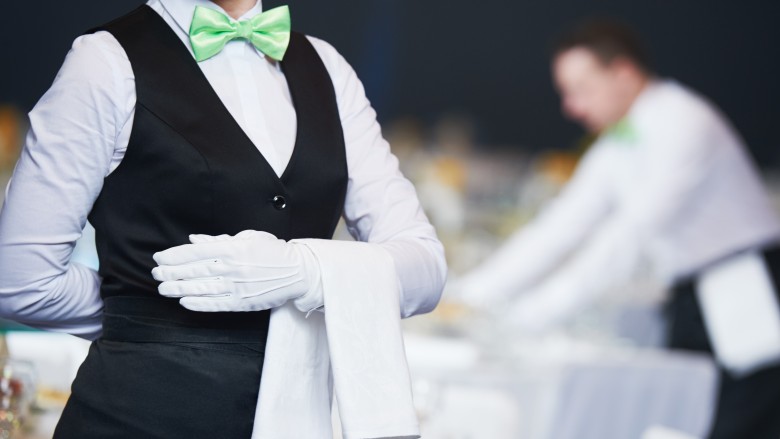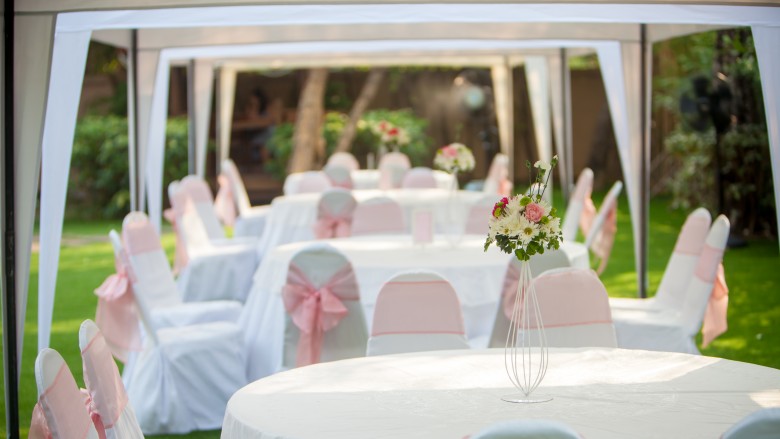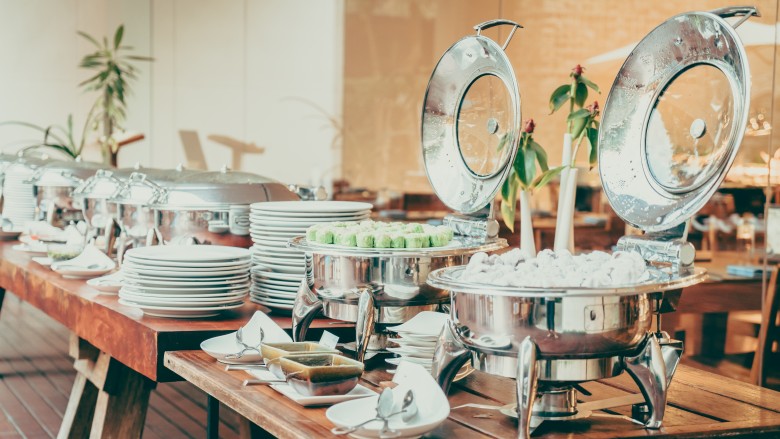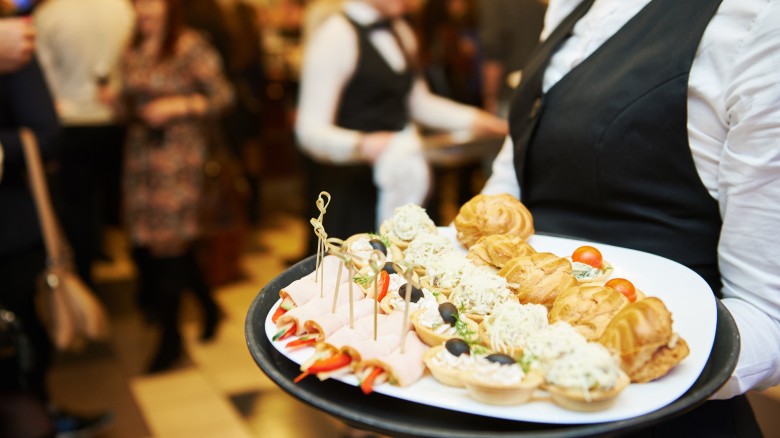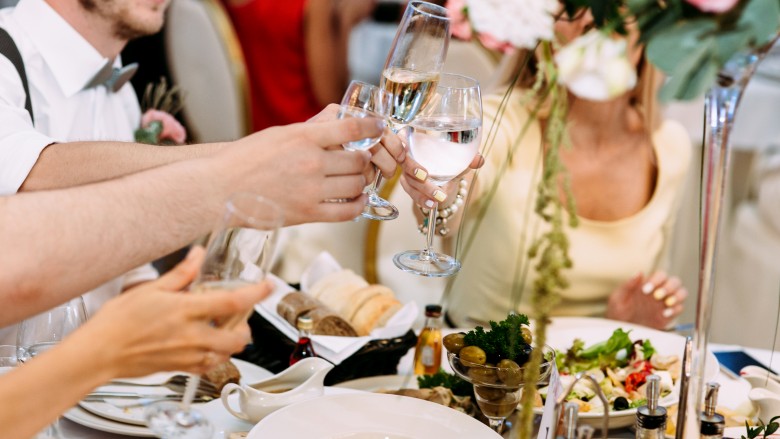Things Your Caterer Wishes You Knew
Whether hosting an elegant dinner party in your home, planning a retirement dinner for a co-worker, or making arrangements for a wedding, hiring a caterer can be a daunting and overwhelming experience. And the choices when it comes to catering certainly aren't simple. Do you need a full-service caterer who can completely recreate a restaurant experience — from linens to a martini bar to shrimp ceviche — at a remote locale? Maybe it's just a backyard barbecue with plastic utensils and a keg you picked up. Perhaps a chef-created special meal in your own home? And let's not forget restaurants and catering venues, which provide you with almost everything you need under one roof — just order the food and drinks of your choice.
I spent years working in catering, first as a server and then running a boutique Jersey Shore catering company with my BFF specializing in intimate dinner and cocktail parties. I also planned my own 130-guest Manhattan wedding. So let me share with you the ins and outs of hiring a caterer for your event.
Guests will drink more than usual
Estimating the amount of alcohol needed at an event can be tricky, and catering customers tend to err on the side of not offering enough. What's getting lost in translation here? For one, guests do tend to imbibe a bit more when they aren't paying for drinks, and many people have a tendency to set down a drink that's still half full to pick up another at the bar. The weather can also encourage drinking, and a summer event can see chilled beverages getting tossed back pretty quickly. The general rule of thumb in catering is that each guest will have two drinks in the first hour and one drink each additional hour, though you really should allow for more if you want to avoid the ultimate buzzkill of running out before the party is over. If you can't handle the idea of paying for that many high-priced cocktails, ask about cheaper packages (like beer and wine only) or consider offering just one or two specialty cocktails.
You want to provide your own liquor?
Buying your own liquor for an event is a great way to save some big bucks. Ask ahead if your caterer even allows this. Many don't, particularly companies that have paid for a license to serve alcohol. If it is allowed, it's really best to still utilize the company's bartenders and allow them to set up your bar with the proper garnishes and glassware. (No your fraternity brother cannot serve your guests with my equipment.) Also, take your caterer's advice on how much liquor you need. Seeking out a liquor distributor that will allow you to return unopened bottles is the ideal way to make sure you will have plenty of hooch on hand for your event without running low on any party basics.
You don't need to design the menu around special diets
Aunt Joan may have a gluten allergy, and your college roommate's new boyfriend is vegan, but that doesn't mean an entire menu needs to be designed with those preferences in mind. A good caterer can always have some improvisational food available to prepare a dish especially for those couple guests who may have allergies to certain foods. Letting them know ahead of time is the key. Then they can keep those items stored separately to avoid cross-contamination, and staff can be alerted to your guest's needs.
The kitchen at your site really matters
The kitchen or lack of a kitchen at the site of your event is one of the biggest factors in what a caterer can prepare for your party and what the cost will be. If your party is an outdoor event with no facilities or electricity, food will need to be transported there and kept warm. (Side effect: anything meant to be crispy will not be, and anything creamy will be congealed.)
I once threw my husband a birthday party at a bar in New York with no kitchen. I took a chance on a caterer who promised me tasty, hot Southern-style hors d'oeuvres for the duration of the event. I should have known that chicken and waffle sliders were just not meant to be without a kitchen. She arrived with chilled, pre-cooked food in a cooler and attempted to warm it all up with one chafing dish. We ate unappetizingly cold food all night. As a person with catering experience, I should have asked her up front how she planned to serve the food appropriately. Once you have selected a respected caterer, ask them what realistic dishes they recommend for your venue. They might guide you to choices that can be served at room temperature or explain that you'll need to shell out the big bucks to bring or rent the proper industrial equipment.
Pinterest isn't always realistic
Pinterest is an amazing jumping-off tool to inspire ideas for your event, but it should be for just that: ideas. Expecting a caterer to precisely recreate a dish or cake that you saw on Pinterest isn't always realistic or in your budget. If the Pinterest photo you're drooling over is from a professional website or magazine, there's a good chance it was created by a professional food stylist, who may have employed shaving cream, super glue, hidden wires, or toxic paints to achieve the gorgeous but completely inedible look of the photo. Your budget may not match your expectations when it comes to a Pinterest look as well, particularly with large, layered cakes that may have cost thousands when your budget is only in the hundreds.
By all means, show your dream pictures to the caterers, but be sure to find out what they specialize in and what they can pull off for you within your budget.
Quality affects price
When it comes to catering, things are not always equal, and the difference typically comes down to quality. When my BFF and I were running our catering company, the quality of our ingredients was very important to us. We used as many organic, fresh ingredients as we could find, bought higher-quality oils and cheeses, and put great care into our presentation, using servingware we had carefully sourced from antique stores and estate sales. Obviously, we weren't going to be able to match the price of the pizza restaurant down the street that sold catered trays of chicken piccata. But many people are looking for the high-quality catering job done at the pizza-place price. If you want to use a caterer that has a reputation for quality, let them tell you what they can offer you at your budget. They may be able to guide you to cheaper cuts of meat or starchier appetizers that will stretch farther.
You really do need that many servers
You may be surprised to hear how many staff members a caterer recommends for your party. Do you really need that many waiters for a catered event? Yeah, you really do. The amount of staff members you have on hand is going to dictate the pace of your party. Ever been to a wedding where the people at the first table served have finished their meals and hit the dance floor before the last tables have even gotten a whiff of the food? That's a wedding that didn't have enough waitstaff. Buffets also require more staff than you might think. Food needs to be run back and forth from the kitchen to refill trays, and servers will also be fetching cocktails, cleaning spills, and handling special requests. For bartending, the general rule of thumb is one bartender for every 50 to 70 guests, and more than that if you plan to serve a lot of mixed drinks.
Give caterers some space
The years I spent catering involved working a lot of intimate dinner and cocktail parties in a client's home. Naturally, the hosts need to pass through their own kitchens now and then during the course of the parties, but all too often the hosts would hover over us as we cooked. We even worked one dinner party where the entire group refused to leave the kitchen while we cooked, asking us about recipes and other details as we went. It was stressful and gave us the added duty of teaching a cooking lesson as we tried to prepare the meal in the time allotted. We eventually learned to tell people ahead of time that they needed to give us and our staff some space as we prepped and cooked so that we could give them the best party possible. Just like you wouldn't hover over a chef at a restaurant and you wouldn't want someone chewing your ear while you finish up that important report, give your caterer and staff the same courtesy. Also ... isn't that why you hired a caterer? So you wouldn't have to be in the kitchen at your own party?
That per-person charge doesn't include tax and tip
Just like when you eat at a restaurant, the amount of your total bill doesn't include tax and gratuity until the final bill is tallied. So if the caterer you want tells you the minimum you can hire them for is $50 per person, keep in mind that the amount they've quoted you is just for food. In addition to that price for food, you need to pay any tax and gratuity, and you may even need to pay hourly labor costs for all staff members on hand for your event. Those added costs can quickly jack up the price to double what you anticipated spending per person. Different caterers calculate and advertise different prices, so be sure to ask a lot of pointed questions when you're asking about prices.
Plates, glasses, and silverware cost more
A dedicated event venue with its own catering facilities will likely provide its own dishes, glasses, and silverware. But if you want special chairs and plate chargers that match your decor or if you're holding an event on location, then you need to be prepared to pay a pretty penny to rent all of those items, set them up, break them down, and wash them. Don't forget a tent in case of rain, which can run into the thousands to rent. Some food-only caterers will let you shop around for rentals, but most full-service caterers will insist you use their own stock or their preferred list of vendors. And yes, rentals are taxed. It isn't hard to see why holding your event in a restaurant or event hall is a more economical choice than more exotic venues. And once you've rented everything, don't forget the transportation costs of moving a makeshift restaurant to your ideal locale in the woods.
Buffets aren't cheap
One of the more popular misconceptions in catering is that a buffet meal will be cheaper than a plated meal. In many situations, this is not the case, particularly if you want to serve high-end foods. Buffets are difficult to police. Even with a server manning the chafing dishes, if Uncle Sal asks for a second slice of prime rib, the server will need to oblige. Buffets can encourage overeating, and some guests will return to the buffet for a second or even a third pass. Those additional helpings really rack up food costs, and caterers need to account for this. If you're serious about saving money, ask your caterer what they recommend to keep costs down. You may consider more pasta and rice dishes, a meal of only passed finger foods, or a lunch or brunch event where guests tend to not go overboard.
Be realistic about your budget
Folks embarking on their first foray into hiring a caterer (typically wedding clients) are often taken aback by the actual cost of catering an event. Could it really cost that much per person for food? The thing to keep in mind, however, is that you're paying for so much more than just the food when hiring a caterer. Insurance for the company and event, staffing, transportation, the planning and shopping that happens beforehand, set up and clean up — all facets of running a catering company factor into the cost per client. To save you and your caterer time, do your research beforehand and be clear about your per person budget for your event.
And that's your "soup to nuts" budget, which includes taxes, tips, and rentals. In the industry, that's called the "plus plus" (and is denoted as "++" next to the price). Telling your caterer your budget at the start will help the caterer create a menu and event for your party that you can afford. At that point, you can decide if some more splurges are worth it to you. My husband and I added a passed baby lamb chop appetizer for our wedding reception, though it wasn't part of the package we had purchased, because it was something special that we both wanted. Creating a menu around your one or two "splurge" items is a way caterers can help you stick closer to a budget.
An accurate headcount is crucial
Another incorrect assumption made by many catering clients? That the caterer has oodles of extra food on hand in case you (accidentally or intentionally) fudge your guest count numbers. While all caterers have their own policies, a general rule of thumb is that, yes, there's probably a little more food on hand for extra guests if they show up — but not much. And you do indeed need to pay for it. In fact, some caterers will even charge more than your per person charge for extras, as it places unplanned-for stress on staff. Before you start to get creative with your head count, take another glance at your contract, which likely has a clear policy on no-shows and extras at your event.



